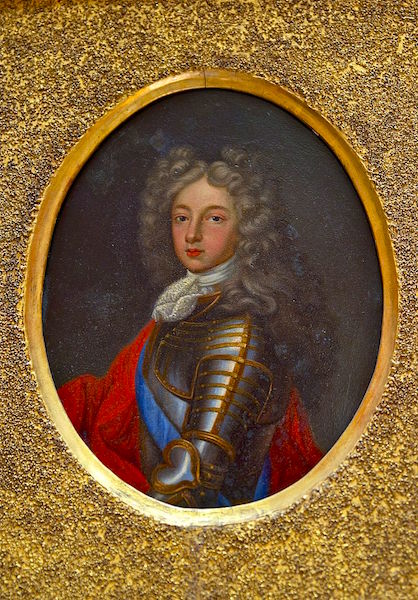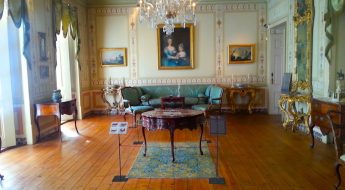A Letter of Advice from Louis XIV to His Grandson, Felipe V of Spain
Having been declared King of Spain on 16 November 1700, Felipe V, formerly Philippe d’Anjou, left Versailles for Spain on 4 December. He didn’t reach Madrid until 22 January 1701. Along the way, he would have had plenty of time to read and ponder the letter handed to him by his grandfather on his departure.
Louis XIV had composed a 33-point letter of advice for his teenaged grandson, bringing to bear the experience of his then nearly 6 decades on the French throne, 4 of them as sole ruler. Some of his advice is in the spirit of ‘Do as I say, not as I do.’ It also reveals some of the Sun King’s notions of kingship.

Felipe V as Philippe d’Anjou, probably just before his accession.
The letter was recently published (in French) by the excellent digital journal Esprit XVIIIème. I have translated the text of the letter below, and added some explanatory notes at the bottom. The letter is dated 3 December 1700:
- Do not neglect any of your duties, especially those you owe to God.
- Preserve yourself in the purity of your upbringing.
- See that God is honoured everywhere that you hold power; promote His glory, and set the example of it: this is one of the greatest boons that kings can confer.
- Declare yourself for virtue and against vice on all occasions.
- Never be attached to anyone.
- Love your wife, live in harmony with her, ask God for one who suits you. I do not believe you should take an Austrian.
- Love the Spaniards and all the subjects attached to your crowns and to your person; do not favour those who flatter you the most; esteem those who, for the good, will take the risk of displeasing you: these are your true friends.
- See to the welfare of your subjects; in this regard, do not make war unless you are forced to and you have duly considered the reasons for it in your Council.1
- Try to restore your finances; see to the Indies2 and your fleets; think of commerce; dwell in close union with France, nothing being so good for our two powers as this union which nothing could withstand.
- If you are constrained to make war, place yourself at the head of your armies.
- Think of re-establishing your troops everywhere, and begin with those in Flanders.3
- Never neglect business for your own pleasure, but create for yourself the kind of regimen that gives you free time and time for recreation.
- There is scarcely more innocent a recreation than hunting, and a fancy for some country house, provided that you do not spend too much on it.
- Pay close attention to business; when people speak of it to you, listen a great deal at first without deciding anything.
- When you have more knowledge, remember that it is up to you to decide, but whatever experience you have, always listen to all the opinions and arguments of your Council before making your decision.
- Do everything you can to get to know the important people in order to make use of them appropriately.
- Take care that your viceroys and governors should always be Spanish.
- Treat everyone well; never say anything disagreeable to anyone, but distinguish people of quality and merit.
- Show gratitude to the late king and all those who were in favour of choosing you to succeed him.
- Have great confidence in Cardinal Portocarrero,4 and testify to the line of conduct that he took.
- I believe you should do something considerable for the ambassador5 who was so fortunate as to make the offer to you and to be the first to salute you as a subject.
- Do not forget Betmar,6 who has merit and is capable of serving you.
- Have full confidence in the Duke of Harcourt7: he is an able man and a gentleman, and will never give you counsel but with regard to your interest.
- Keep all the French in order.
- Treat your servants8 well, but do not allow them too much familiarity, and still less confidence, and make use of them according to how prudent they are; send them home for the smallest mistake they might make and never support them against the Spaniards.
- Have no dealings with the Queen Dowager9 but those you cannot avoid; see to it that she leaves Madrid, but that she does not leave Spain; wherever she may be, observe her behaviour and prevent her from meddling in any business; hold in suspicion those who have too many dealings with her.
- Always love your relations; remember the pain they felt on leaving you; bear with them in things great and small; ask of us anything you need, or that you cannot find where you are; we will do the same with you.
- Never forget that you are French, and when you have assured the succession of Spain with children, visit your kingdoms: go to Naples and to Sicily, pass by Milan and come to Flanders; this will be an occasion to see us again; in the meantime, visit Catalonia, Aragon, and other places; see what you can do for Ceuta.10
- Throw some money to the people when you are in Spain, especially when entering Madrid.
- Do not appear shocked at the extraordinary characters you will find, and do not make fun of them at all: each country has its own particular ways, and you will soon be accustomed to what will at first seem most surprising.
- As much as you can, avoid granting favours to those who give money to obtain them; give purposefullly and liberally and hardly ever accept presents unless they are trifles; if sometimes you cannot avoid accepting them, give more valuable ones back to those who gave them to you after having let a few days pass.
- Have a coffer to keep your private things in and to which only you have the key.
- I will end with one of the most important pieces of advice that I can give you: do not allow yourself to be governed; be the master; never have favourites or a prime minister; listen to and consult your Council, but decide for yourself: God, Who has made you king, will grant you the necessary wisdom to the measure of your good intentions.
NOTES
- The Council of State (Conseil d’État).
- In the Versailles Century, the ‘Indies’ could mean the Americas or Asia; the bulk of the Spanish colonial empire was in Central and South America.
- More or less modern Belgium.
- Born 1635; died 1709. A cardinal and archbishop of Toledo, he served on the regency council that ruled Spain between the death of Carlos II and the arrival of Felipe V, whose candidacy for the crown he vigorously supported.
- Manuel de Semmenat, Marquis of Castel dos Rios. Died 1711.
- I have not as yet been able to identify this individual.
- Born 1654; died 1718. Scion of an ancient Norman family, he was the French ambassador in Madrid 1697-99 and 1700-01. He played a significant role in persuading the Spanish powerbrokers to back Felipe V as successor to Carlos II. Louis XIV later made him a Marshal of France and gave him a dukedom.
- ie. his French servants
- Maria Anna (Mariana) of Neuburg. Born 1667; died 1740. The widow of Carlos II and sister-in-law of the Emperor Leopold, she had intrigued to have her nephew, the Archduke Charles, named her husband’s heir.
- A beleaguered Spanish outpost in North Africa. It’s surrounded by Morocco on the landward side and still belongs to Spain, along with Melilla.


















Leave a Comment